The
PhotoDrama of Creation
Section 4
Joseph
and His Brethren
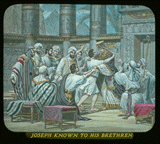
In due time Joseph
revealed himself to his brethren. After speaking sternly
to them he made them a feast, sending them portions
from his own table. They were astonished and fearful,
wondering what the kindness signified. Then, sending
away the Egyptian servants, Joseph made himself known
to his brethren, assuring them of his forgiveness, and
that God had caused all of his trying experiences to
work out for his good, and that he was glad to be the
saver of their lives as well as the lives of the Egyptians,
under the Providential guidance which sent him to Egypt.--Genesis
45:4-8.
It is assumed
by Bible scholars that if Joseph typically represented
Christ and His Church, exalted to Kingdom honors, so
Joseph's brethren would represent the Jews, and the
Egyptians represent the remainder of mankind. If this
be true, it tells us that neither Jews nor Gentiles
have aught to fear from the glorious exaltation of Messiah.
On the contrary, the Glorious One who was crucified,
premeditates a great "feast of fat things"
for the whole world, including his brethren, who sold
him to be crucified.--Isaiah 25:6.
The strength
of Joseph centered in his knowledge of the Divine Promise
made to Abraham. Surely a knowledge of God's Plan seems
indispensable. Trust in God was the secret of faithfulness
in all the worthy ones of the past. The same principle
still holds true. It seems true, as sometimes charged,
that lawlessness is growing in proportion as Higher
Criticism destroys faith in the Bible and its promises.
When
later the Israelites moved into Egypt, we see the faith
of Joseph manifested in his dying request. He said,
"God will surely visit you and bring you out of
this land [Egypt] into the land [Canaan] which He sware
to Abraham." He was solicitous that his bones be
carried with the Israelites into Canaan. (Genesis 50:24,25.)
Joseph's various experiences seem to Bible students
to typify those of Jesus and His Church--in suffering
and in subsequent glory and honor.
At
the Burning Bush
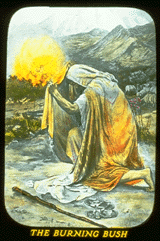
Moses showed
himself great in every sense of the word. As an infant,
Moses was placed by faithful parents where an Egyptian
princess found him, amidst the bulrushes of the Nile,
and adopted him. Safe in the midst of his enemies, he
received an ample education in "all the learning
of the Egyptians." The honors of the Egyptian Court
were his, but he was too patriotic to enjoy them while
his kinsmen suffered severe persecutions. Intent upon
helping his brethren, he slew an Egyptian taskmaster.
He was disappointed that his brethren did not appreciate
his endeavors to aid them, but reported him as a traitor
to Egypt.
He fled to Midian,
and was gone forty years. Then God's time having come,
he was sent to deliver his people Israel; but by now
he was timid and feared his inability. By Divine command,
Aaron became his mouthpiece, and the message was carried
to Pharaoh that Israel must be let go. This commission
to Moses was given at the burning bush--a bush which
apparently was all aflame, yet not consumed. The Lord's
messenger used this means for communicating the Divine
message in an impressive manner, and to give him courage
and confidence in his mission.
The
truthfulness of the narrative is confirmed by Jesus.
Certain Sadducees, denying the resurrection, sought
to entrap Him, inquiring whose wife a woman would be
if during her lifetime she had had seven husbands. Jesus
in reply defended the doctrine of the resurrection.
He declared that when God said to Moses, "I am
the God of Abraham, Isaac and Jacob," this surely
meant that Abraham, Isaac and Jacob were to be resurrected.
The Sadducees denied the resurrection and all future
life. On the contrary, God's word at the mouth of the
angel proved that there is to be a resurrection of the
dead. God thus spoke of things that were not as though
they already were. "All live unto God" in
the sense that in Christ He has provided for the reawakening
of all, "in due time."
The
Passover Instituted
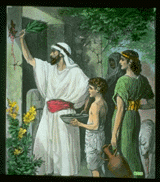
Time and again
Moses and Aaron went to Pharaoh with God's message,
"Let My people go!" Time and again plagues
were given as a punishment for refusing to let them
go. Time and again Pharaoh declared that if the plagues
were stopped he would let them go, and time and again
he broke his word. The Scriptures say, "And for
this very purpose God raised Pharaoh up, that He might
show forth His Power through him." This is interpreted
to mean that God could have brought another prince to
the throne of Egypt. He favored this particular Pharaoh
because of his wicked self- will, obstinacy and selfishness.
The Scriptures
declare that the Lord hardened Pharaoh's heart. The
explanation is that it was the goodness of God that
hardened Pharaoh's heart. Divine goodness and generosity
were shown in the removal of the various plagues as
soon as Pharaoh promised to do right. This, instead
of inciting him to love and obedience, led him to a
greater obstinacy. He determined, as he had passed through
one plague after another, that others could not be much
worse. He paid dearly for his defiance.-- Exodus 4:21;7:3;14:4.
The tenth plague
was the crisis. All the first-borns of Egypt died, but
the first-borns of Israel under the sprinkled blood
were safe. Thus God pictured the "Church of the
First- borns," now being "called" out
from the world. After glorification by the First Resurrection
they will be the "Royal Priesthood," Spiritual
Levites, for the blessing of all Israel, and through
Israel, all the families of the Earth.
Bible
students hold the Passover night to have typified this
Gospel Age of nearly nineteen centuries, during which
the spirit begotten ones, the church of the First-borns,
are to be passed over, or specially saved, and made
partakers of the Divine nature and associates in the
Messianic Kingdom for the blessing of the later born,
during Messiah's Reign. The blood sprinkled on the door-posts
typed faith in the blood of Christ.
Israel's
Wilderness Experiences
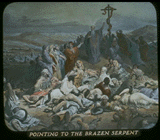
Israel was taught
lessons of faith in the wilderness. God sent them Manna.
It came in the night in very small grains. It required
time and patience to gather and prepare it. Not only
was it a necessity, but it corroborated the Divine sentence,
"In the sweat of thy face shalt thou eat bread,
until thou return to the ground." Labor has been
one of our most valuable lessons. Without it our race
would have sunken still lower. Countries in which labor
has been a necessity attest this by their greater intelligence.
Jesus explains
that He Himself is the antitypical Manna, or Bread from
Heaven, of which we must partake if we would have everlasting
life.--John 6:48-58.
The conspiracy
of Korah and his associates against Moses' leadership
resulted in their all going down alive into the pit
(Hebrew, Sheol), the tomb. So all opponents of Messiah
will perish in the Second Death.--Acts 3:23.
God sent Israel
a miraculous supply of quail. Our Common Version permits
the inference that quail fell around the camp several
feet deep. This is pointed to by critics as absurd.
The correct and reasonable thought is that quails, wearied
from flight across the Red Sea, flew within a few feet
of the ground, where Israel easily captured great quantities.
The lesson of
the Smitten Rock is noteworthy. When the people were
famished, Moses smote a rock in the name of the Lord,
water gushed out and the people were refreshed. St.
Paul says that this was prophetic of Christ who by His
death supplies the Water of Life, which is for all--Israelites
indeed.
A
plague of "fiery serpents" attacked the Israelites.
By Divine direction Moses made a serpent of brass and
raised it up. The Israelites were directed to look to
that serpent for healing. The "fiery serpents"
represent Sin, inflicting death. God has provided life
for the sin-bitten world through the crucifixion of
Christ. He was treated as a sinner, in order that sinners
might be freed from sin and death.
The
Law Covenant at Mt. Sinai
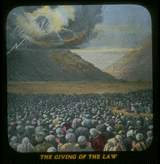
Moses served
as mediator between God and Israel at Mt. Sinai. The
people there covenanted to keep the Divine Law. God
promised that if they could do so, perfectly, they should
have everlasting life. Furthermore, they could then
comply with the sacrificial conditions of the Seed of
Abraham, typified in the offering of Isaac, and inherit
the Promise, "In thy Seed shall all the families
of the Earth be blessed."-Deuteronomy 5:1-6;Genesis
22:18.
The people eagerly
accepted the arrangement, saying, "All these things
will we do," not realizing the full import of the
Law. Jesus explained it to mean, to love God with all
the heart, mind, soul and strength, and one's neighbor
as one's self. Imperfect, like all mankind, the Jews
could not keep this perfect Law. Unworthy of life, they
could not redeem others; hence could not bless other
nations.
When they became
discouraged, God assured them that later He would make
a New, or more favorable, Covenant with them through
a greater than Moses, who would help them out of their
fallen condition and fit them to be the channel for
the Divine blessing to men.--Jeremiah 31:31; Malachi
3:1-3.
In
due time Jesus came, the promised Messiah, not in glory
as they had expected, but in a lowly condition, to die
for Sin. "He came unto His own [nation] and His
own received Him not"--they crucified Him. (John
1:11) Nevertheless, Jesus began His work of selecting
Spiritual Israel, the Spiritual Seed of Abraham. He
accepted first the loyal Jews. (Romans 11:7.) Still
there were not enough to complete the foreordained number
of the Elect. Consequently the Call to be the Elect
Abrahamic Seed was extended to the Gentiles. For more
than eighteen centuries He has been gathering the Elect
Spiritual Seed of Abraham, the holy from every nation
and sect. When complete, these, the "Bride,"
or "Body" of Christ, will be God's channel
of blessing to all the families of the Earth, in harmony
with the Promise made to Abraham.--Galatians 3:29.
The
Typical Tabernacle
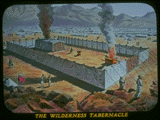
God foreknew
the Israelites would be unable to fulfil the Law Covenant,
and although He gave minute instructions respecting
the Tabernacle, and the sacrifices to be offered therein,
yet it was only for the lessons it would convey to us.
The Tabernacle, in its Court, Holy and Most Holy, in
its furniture, priests and sacrifices, illustrated the
most important features of the Divine Plan.
St. Paul informs
us that the bullock of the sin-offering on the Day of
Atonement typified Jesus in the flesh. The killing of
the bullock represented the sacrifice of Jesus, begun
at His baptism. In His sacrificing, Jesus was also the
antitypical High Priest. The offering of incense on
the Golden Altar represented Jesus' heart endeavors
in doing the Father's will.
Carrying the
blood into the Holy represented the consecration of
the antitypical priest, the veil thus symbolizing the
death of his will, because of which he is accepted as
a New Creature. The High Priest passing under the veil
typified The Man Christ Jesus pouring out His soul on
Calvary, laying down in death the body which God prepared
Him.
The High Priest
sprinkling the Mercy-Seat typified Jesus, in Heaven
itself, offering to Justice, first His own sacrifice,
and then His Church's sacrifice. Nothing could be done
with the blood of the Goat (the Church) till the blood
of the Bullock (Christ Jesus) had made it holy and acceptable.
The High Priest
washing and dressing in the Court represented The Christ
complete, changing from the "Body of humiliation"
to conditions of glory and power. Clad in his robes
of glory, the High Priest represented Messiah, empowered
to bless mankind.--Exodus 28:2; Philippians 3:21.
Aaron
blessing the people typified Messiah at His Second Advent
blessing all who will become true Israelites during
the Messianic Reign. The people shouting and falling
on their faces represented recognition of the end of
the reign of Sin and Death. Their arising represented
resurrection.
Crossing
the Jordan
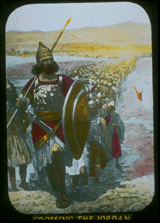
Finally, after
their wilderness journey of forty years, the Israelites
were brought to the Jordan, and shown where they were
to cross over under the leadership of Joshua. Moses
meantime, after blessing Joshua, had died in Mt. Nebo.--Deuteronomy
4:21,22;9:1;32:48-52;34:5,9.
On this occasion,
a stupendous miracle permitted the Israelites to pass
through the bed of the Jordan into Canaan, the waters
being cut off. Everything was so well timed by the Lord
that when the Priests stepped up to the waters, bearing
the Ark, and their feet touched the outer edge, the
waters began to subside. The Priests advanced as the
waters subsided, and stood in the midst of the river
Jordan until all the hosts of Israel had passed over.--Joshua
3:3-17.
Infidelity has
scoffed at this incident as an impossibility, but recent
research shows that the miracle did take place, and
the means which the Lord adopted for it. Be it understood
that every miracle, from the Divine standpoint, is simple
enough. Yet God, even in miracles, usually operates
along the lines of natural means. It is now ascertained
that the waters of the Jordan were cut off some miles
above the place of crossing, at a place called Adam.
There a great hillside slid into the river, filling
its bed and causing the water to back up, forming little
lakes. Gradually it cut its way through. It was then
that the Israelites passed over Jordan "dry shod."
Antitypically,
the crossing of Jordan would represent the fact that
God's people now pass from death unto life, through
faith in the blood of Jesus. The new life begun, they
walk by faith, they live by faith, and by faith they
fight the good fight, in the name of the Lord and under
His guidance. And the name Joshua means Jesus, Savior,
Deliverer.
Respecting
the types and prophecies of the past the Apostles tell
us that the Law was a shadow of better things coming
after, and that those things were written for the special
instruction of the Church.--Romans 15:4; Hebrews 10:1.
Joshua's
Long Day
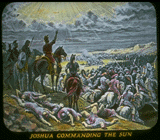
There was some
foundation for the Bible narrative of Joshua's long
day. Some Bible students claim that the language of
the Hebrew text teaches that the day was dark, that
the Sun did not shine at all--an extremely unusual thing
for Palestine. The enemies of Joshua were Sun worshipers,
and the darkness of the day foreboded that their Sun-
god was eclipsed. In the narrative, the immense hailstones
killing so many seems quite in line with this interpretation--
that the day was dark instead of light--that the obscurity
of the Sun and the Moon was really a great phenomenon,
which Joshua made use of to discomfit the foe, commanding
the Sun and the Moon to stay hidden!--Joshua 10:11-14.
The other explanation
is equally logical. It assumes that the Sun was visible
during the day, and that heavy clouds refracted the
Sun's rays unusually late in the evening--until the
Moon rose, so that there was no time without light.
Either explanation
is satisfactory. It is quite unnecessary that any stumble
over this Bible narrative.
The triumph of
Gideon's little army over a host, typified the final
victory of Christ and His followers over the hosts of
Sin. The broken vessels represented self-sacrifice to
let the light shine out--the trumpets the Gospel Message--the
sword God's Word. Of Gideon and his brethren it is written
that each looked like the son of a king. Christ and
His followers all are Godlike in character.--Judges
7:16-25;8:18.
Jephthah's daughter
was not sacrificed in death as a fulfilment of her father's
vow. She merely took the vow of perpetual virginity
and figuratively became dead to the world after spending
a brief season with her virgin friends. The Bible is
simple and reasonable when understood.--Judges 11:30-40.
The
overthrow of the Midianites by Gideon's band and Jephthah's
dedication of his daughter to the Lord in perpetual
virginity, belong to the period of the Judges, of whom
Joshua was first.--Acts 13:19,20.
David
Anointed By Samuel
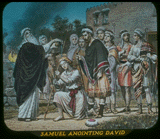
The story of
the selection of David, the shepherd boy, to be King
over Israel, is full of interest for both old and young.
The Prophet Samuel, who did the anointing, was guided
specially of the Lord. Samuel himself was dedicated
to the Lord in his youth. When the time came for him
to anoint a successor to King Saul, all the sons of
Jesse passed before him. They were a fine family, and
he was expecting one after another to be the proper
one, but God guided him otherwise. David, the lad who
was with the sheep, was not thought of until all the
others had been scanned in vain; then David was brought,
and the Lord indicated that this was the one to be anointed.--1
Samuel 16:1-13.
The story of
David is of special interest to us because his name
signifies Beloved, and because he typified The Christ--
Jesus and His faithful brethren, the Church, God's specially
beloved, the Elect, who are to inherit the Messianic
Kingdom.
David was anointed
long years before he became king. So Christ received
the anointing of the Holy Spirit at His baptism, and
the Church recieved the anointing at Pentecost--long
years before the Messianic Kingdom's establishment.
The trials and testings of David were to prepare him
for his office as king. And likewise the trials and
difficulties of The Christ, Head and Body, fit and prepare
them for the Kingdom.
In
typical Israel, the priestly office was kept distinctly
separate from the kingly office, but in Christ the two
offices combine. This was illustrated in the double
office of Melchisedec, who was a priest upon his throne,
or a royal priest. Similarly, The Christ, Head and Body,
will be the antitypical Royal Priesthood, to reign for
a thousand years. This is in harmony with St. Peter's
statement, "Ye are a Royal Priesthood, a holy nation,
a peculiar people." It agrees with the statement
that those who share in the First Resurrection will
be kings and priests unto God and reign with Christ
a thousand years.-- Revelation 20:6;5:10; 1 Peter 2:9.
King
Saul's Life Spared
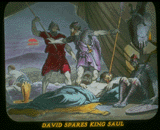
King Saul was
the first of Israel's kings. He was tall, head and shoulders
above his brethren, and from the human standpoint was
rather ideal. He had considerable wisdom, too. Indeed,
that was his failure. He overlooked the fact that his
Kingdom differed from all other kingdoms, and he attempted
to rule after the manner of other kings. In the case
of Israel, God declared Himself King, and the person
upon the throne was really His representative, and should
be guided by Him in everything. Because David at heart
was anxious to do all these things, and very repentant
whenever he learned that he was wrong, he was spoken
of as "a man after God's own heart." His heart
was right.
The anointing
of David was kept a secret, but Saul nevertheless began
to see that God's favor was with David, and that the
people of Israel loved him, especially after he delivered
them from Goliath, and won a number of battles. King
Saul selfishly desired that his own family should be
perpetuated upon the throne, and hence he was bent upon
destroying David. He made him an outlaw, and on every
occasion sought to kill him, and thus thwart God's purpose.
David, on the
contrary, on two occasions had King Saul's life at his
disposal, yet did not take it. In this he was a man
after God's own heart. God had caused him to be anointed,
and would give him the throne. Until God's time should
come, David would wait. In sparing King Saul's life,
David acted in harmony with the Lord's will: "Touch
not Mine anointed, and do My Prophets no harm."
King Saul was God's anointed, and it was for God to
depose him and to give the throne to David in His own
time. And He did.
How
valuable it would be to all of us to learn this lesson
of patience and waiting upon the Lord, for Him to direct
in His own time and in His own way. This was the spirit
of Jesus: "Not My will [as a man], but Thine [Father
Divine], be done."--Luke 22:42.
|
